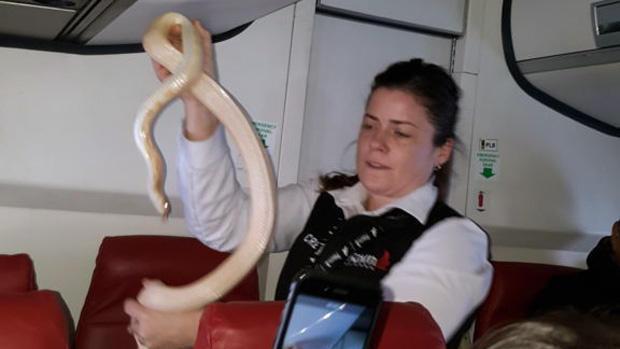N. Korean missile landed near passenger jet's flight path
There are new concerns about the safety of commercial passenger planes after North Korea's latest missile test came dangerously close to an Air France jet's flight path.
The intercontinental ballistic missile (ICBM) that Kim Jong Un's regime launched on Friday flew for about 45 minutes before landing in the Sea of Japan -- where the plane carrying hundreds of people had flown by just minutes earlier.
As CBS News correspondent Kris Van Cleave reports, Air France has confirmed that the falling missile presented no danger to the flight, but the relatively close encounter is raising new questions -- not just about North Korea's future threat to foreign nations, but its current potential danger to air travelers.
- Tillerson: U.S. willing to talk to N. Korea, if it gives up nukes
- North Korean missile might reach U.S., but can it land?
- China: U.S. and N. Korea have "primary responsibility" to ease tension
Pentagon officials have said the latest missile test by the North presented the biggest potential threat yet -- demonstrating technology that could put the U.S. mainland in range of the rogue state's rockets. Officials believe the Hwasong-14 missile tested could possibly even reach New York.
Even though it was an unarmed missile, it still put civilians in harm's way.
"They absolutely are creating danger to commercial air space," former National Transportation Safety Board chairman Mark Rosenker tells CBS News.
At 9:55 a.m. Eastern on Friday, Air France Flight 293 took off from Tokyo, headed for Paris. About 45 minutes later, North Korea launched its missile. It climbed to more than 2,000 miles above the Earth. While the missile was in flight, so was the French jet, with 332 people aboard. The plane's flight path took it about 100 miles off the coast of japan -- the same area where the missile landed some 10 minutes later.
Air France issued a statement saying "North Korea's missile test zones do not interfere in any way with Air France flight paths… we constantly analyse potentially dangerous fly over zones and adapt our flight plans accordingly."
But Rosenker, now a national transportation safety expert for CBS News, says the global aviation system isn't prepared for an unexpected missile launch.
"I don't believe that air traffic control would have the capacity to be able to warn a commercial aircraft that a missile was in its flight path," he said on "CBS This Morning."
The U.S. responded to North Korea's latest missile test by conducting a test launch of its own over the weekend, as well as a joint military exercise with South Korea and Japan.
On Tuesday, the U.S. military confirmed a second test launch of an ICBM, saying that while it was "not a response to recent North Korean actions, the test demonstrates that the United States' nuclear enterprise is safe, secure, effective and ready to be able to deter, detect and defend against attacks on the United States and its allies."
The unarmed Minuteman III missile was launched early Tuesday morning from Vandenberg Air Force Base, California. Unlike North Korea, U.S. protocols include clearing commercial airspace before any test missiles are launched.
On Monday, President Trump promised to hold North Korea accountable.
"We're gonna be able to handle them. It will be handled," he said.
Japan's ambassador to the United Nations has said he expects the Security Council to draft a new sanctions resolution against North Korea within days.




